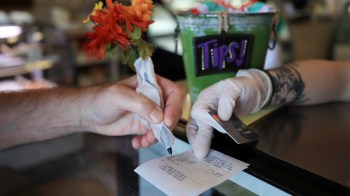Credit card crisis on the horizon
TEXT OF STORY
Kai Ryssdal: Shares of MasterCard lost nearly 4 percent today ahead of the release of its earnings report after the close. And, indeed, it swung to a loss last quarter. Profits are eroding as customer spending slows and the card companies collect less in fees. But MasterCard, Visa and all the rest aren’t actually all that eager for new business.
As more and more Americans fail to make payments on things like houses, cars and, yeah, their credit card bills, card companies are tightening up their standards. And that may be squeezing their profits. Rachel Dornhelm reports.
Rachel Dornhelm: On paper, landscape designer David Searles looks like a great credit card customer. He’s had one of his American Express cards for more than 10 years. He hasn’t touched it in nine months. He says he’s never missed a payment on the card. He did push it to its limit last year, but paid off the balance quickly. Still, six weeks ago, AmEx cut him off.
David Searles: You can see zero balance, $500 available credit. That used to say $19,500 or somewhere in that area, give or take a thousand.
Searles thinks AmEx is scared by statistics showing increasing numbers of Americans failing to make their interest payments.
Searles: And I think, from their fear they’re throwing this blanket out over a bunch of us, that they don’t have any idea who or what is under the blanket.
AmEx wouldn’t talk on tape about any individual account. In an email, the company says it is being more targeted in response to economic conditions. It acknowledged more clients are having their credit lines cut as the company manages its risk.
John Ulzheimer is president of consumer education for Credit.com. He says credit card companies are increasing interest rates, too. And sometimes terminating accounts altogether.
John Ulzheimer: My phone and my email at the end of the day let off a stream of smoke from the number of callers and emailers who are complaining about these types of activities.
He says it’s not necessarily the card holders’ fault.
What we’re trying to explain to people is this is a product of the environment, not necessarily always a product of their credit.
He’s talking about the worry that the credit card industry could melt down the way the mortgage business did. Remember those toxic bonds backed by home loans? Well, institutions have made bonds out of bundles of credit card loans, too.
Greg Larkin is a senior analyst at Innovest Strategic Value Advisors. He says, by end of 2009, Americans will default on $96 billion of credit card debt. And those credit card-backed bonds will be worth a lot less.
Greg Larkin: By the time we know who invested in the securitized credit card portfolio, it’ll be too late, because the reason you’ll know about who invested in it is because they say we’re announcing losses on credit card write-offs.
That $96 billion in credit card defaults doesn’t come close to the $700 billion in home loans. But card companies want to stop the rot now. Clamping down on spending limits reduces their risk. But Larkin says it restricts consumers’ ability to spend, and that could slow the country’s recovery.
Larkin: Historically, one way you deal with a recession is that people spend their way out of it. And so, I think it’s going to have a sort of multiplier effect that will make the recession worse and last longer.
Card companies know a recession will affect them, too. But they’re still getting more conservative. John Ulzheimer says the balance of power inside the credit card companies has shifted.
Ulzheimer: You really have two competing forces for control of the ship. You have the marketing people and you have the risk people.
In the past, he says, marketers had the upper hand. Now risk managers have taken the helm. In this climate they want borrowers that are practically risk free. Sticking to that kind of consumer will keep the companies safer, but it won’t make them nearly as much money.
I’m Rachel Dornhelm for Marketplace.
There’s a lot happening in the world. Through it all, Marketplace is here for you.
You rely on Marketplace to break down the world’s events and tell you how it affects you in a fact-based, approachable way. We rely on your financial support to keep making that possible.
Your donation today powers the independent journalism that you rely on. For just $5/month, you can help sustain Marketplace so we can keep reporting on the things that matter to you.


















